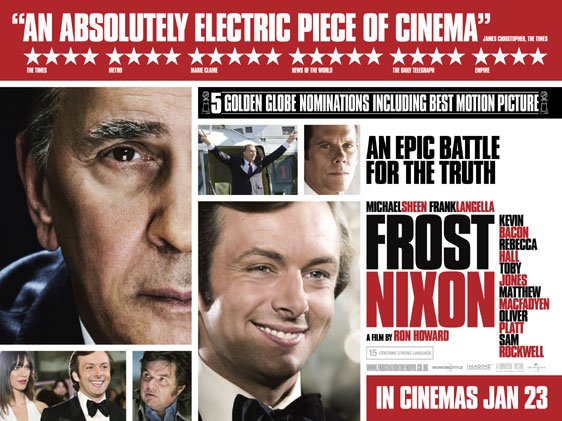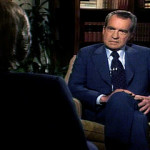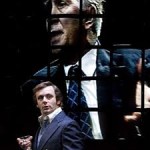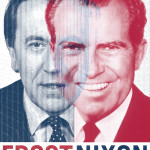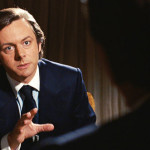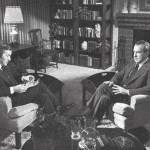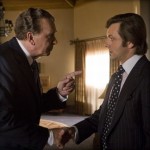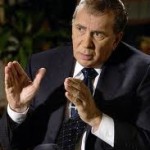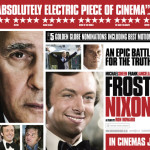I write this on the day the death of Sir David Frost was announced. Greatly to my own astonishment and shame I find I have not already written a review of this momentous movie, so in honour of David Frost, legendary broadcaster, here is my tribute to him.
Frost/Nixon captures Frost’s finest achievement, the encounter that gave him true weight and gravitas, but even more than that was a moment in history, a page turning. It originated as a stage play by Peter Morgan. Unusually, the movie adaptation carried over the portrayals of Frost by Michael Sheen and disgraced ex-president Richard “Tricky Dick” Nixon by Frank Langella, and the benefit of such continuity becomes plainly evident in the depth and intensity of performances given by both, of which more anon.
Both Frost and Nixon were in their own right fascinating and complex personalities, plenty for a method actor to get their teeth stuck into. Having studied International Politics, I have long had an interest in Nixon as a personality and politician, though much greater insight into his motivations comes from Robert Coover‘s phenomenal fact-based satirical fantasy The Public Burning, but the psychology of Frost is no less intriguing.
Clearly capable of playing the heavyweight anchorman, why did he choose to present lightweight game shows for much of his career? Although he gave off the impression of a superficial character at times, politicians loved being interviewed by Frost because of his undoubted charm and enthusiasm, a beguiling quality that put people at ease. Not a Day or a Paxman, but he had his own unique style of extracting more information in political interviews. It was subtle but the underlying intelligence and integrity were there for all to see.
There was also unquestionably an ego to be fed, though Frost always yearned for the respect of his contemporaries, and there was no better way to achieve a place in history than by interviewing Richard Milhous Nixon, arguably the greatest intellect ever to reside in the White House, but also a highly flawed individual, many of whose decisions, in conjunction with his Secretary of State Henry Kissinger, had major implications for world politics. Nixon was ultimately responsible both for the bombing of Cambodia, the evacuation from Vietnam, the funding of Pinochet’s coup against Allende’s government in Chile, yet also the defrosting (no pun intended) of American relations with China, all of which were covered to greater or lesser degrees in the Frost-Nixon interviews.
But it was the Watergate scandal that caused the downfall of Nixon, his impeachment, resignation and subsequent pardon by successor Gerald Ford. The movie plays a game of cat and mouse around the issue from first to last. A revelation is what Frost and producer (and later BBC Director General) John Birt were seeking, but when Frost goes in all guns blazing (contrary to the protocol agreed with Nixon’s minders, he is comprehensively outmanoeuvred by the wily old dog and retreats into safe territory, while his support team urges him to find a tactical way to get inside Nixon’s defences and deliver a telling blow. The knack is to identify what question to answer when and how, so the pair circle one another like boxers looking for an opening. Watergate is the proverbial elephant in the room, the ultimate prize but the one place Nixon does not want to go.
Right up to and including the moment Frost finally lands the telling metaphorical blow on the Nixon chin, that chilling moment when the truth of Nixon’s confession before many millions of TV viewer, this encounter is spellbinding, utterly compelling. Every nuance, every twitch and turn, every gesture is calculated, taut and precise. The body language, eye contacts, vocal inflections combine to a masterclass of cinematic communication.
Credit to Sheen and especially Langella for making it so – and the latter fully deserved the Best Actor Oscar for which he was nominated through the best unspoken acting with the face in living memory. It is as if the demons haunting Nixon appear before his eyes to torture him. Langella looks nothing like Nixon but the character is so totally under his skin you cannot imagine that he is anyone but the man, suddenly weary and carrying the burden of the death of the American dream on his shoulders. Suddenly Frost is merely the support act, Nixon fills the entire room in his distress. It is a stupendous performance, an astonishing moment in cinematic history, portraying a moment in real life history.
The epilogue, the final meeting between the pair, is a final reminder that for all the momentous revelations, Frost never really “got” Nixon: his gift of a pair of Italian loafers, which Frost had seen Nixon perusing with a look of what he takes for admiration, is actually loathing for Frost and all he represents.
If ever you wanted to know about the truth behind the facts and the people, this is one movie you must see. There is at least one scene that allegedly did not happen, a mistaken late night call in which Nixon hints that he wants to tell all and just needs to be prompted, but on this case I can forgive a certain amount of weaving fact and fiction. The effect is to galvanise the viewer into the psychology of two immense egos. Brilliant!

